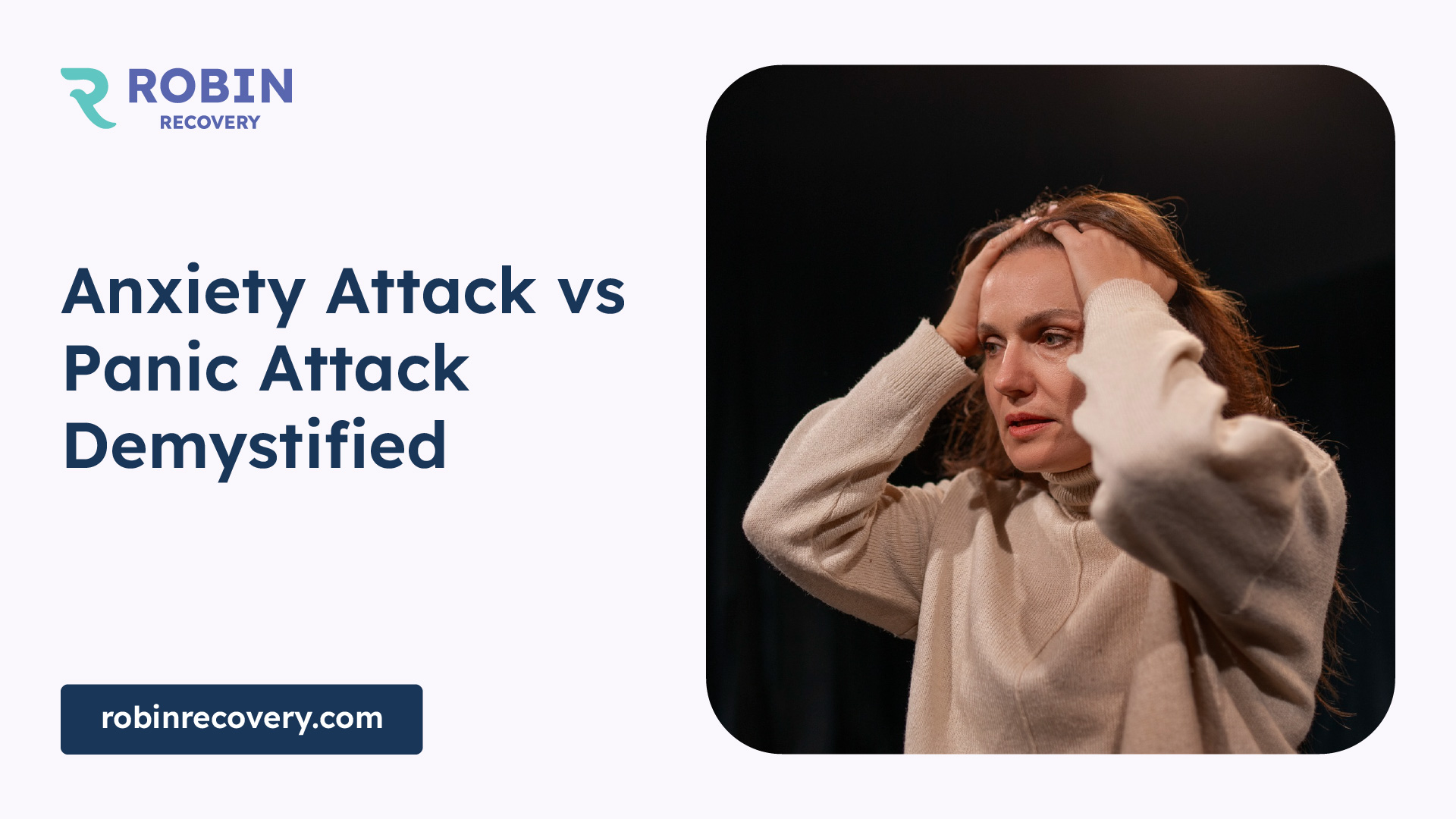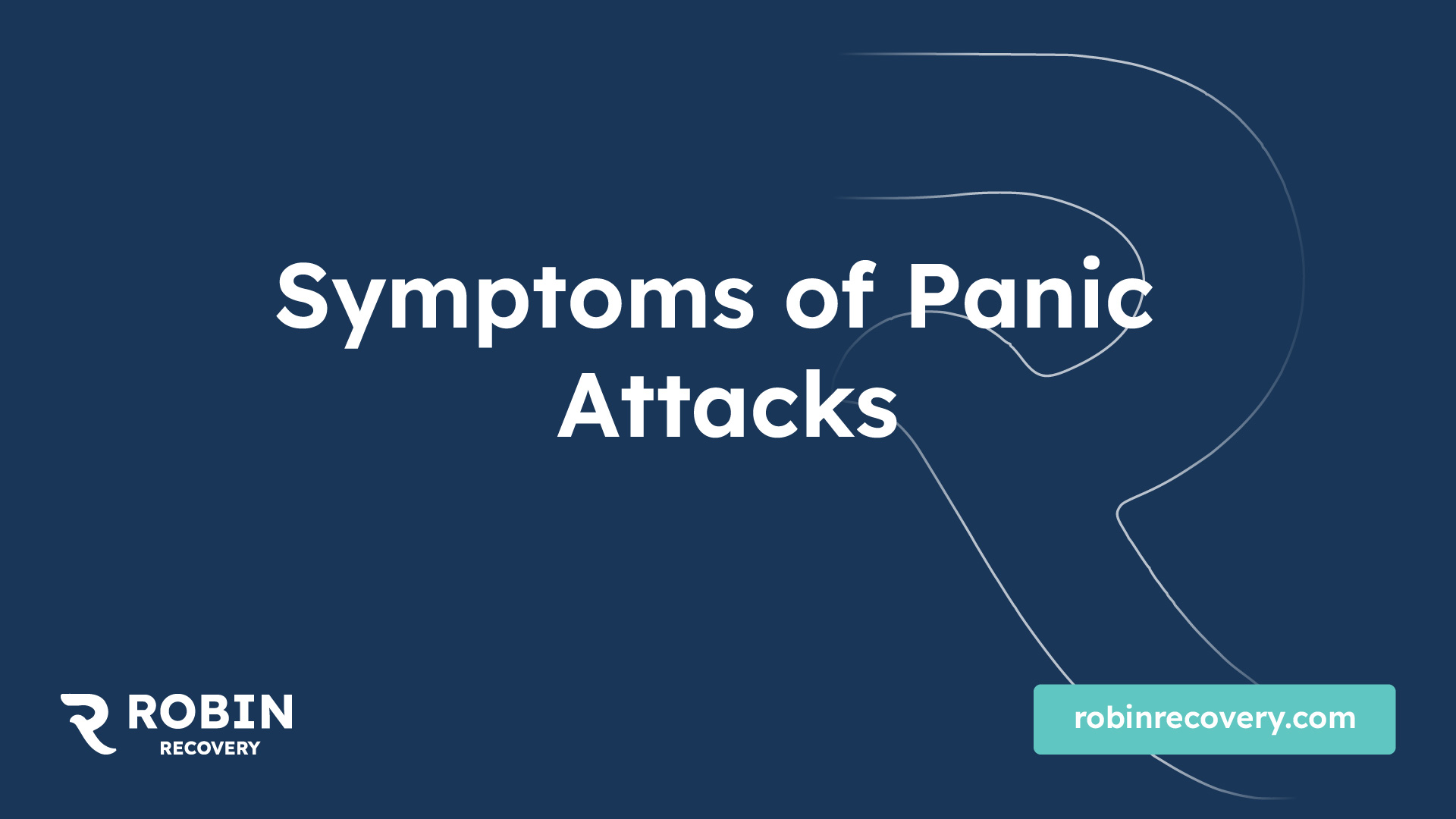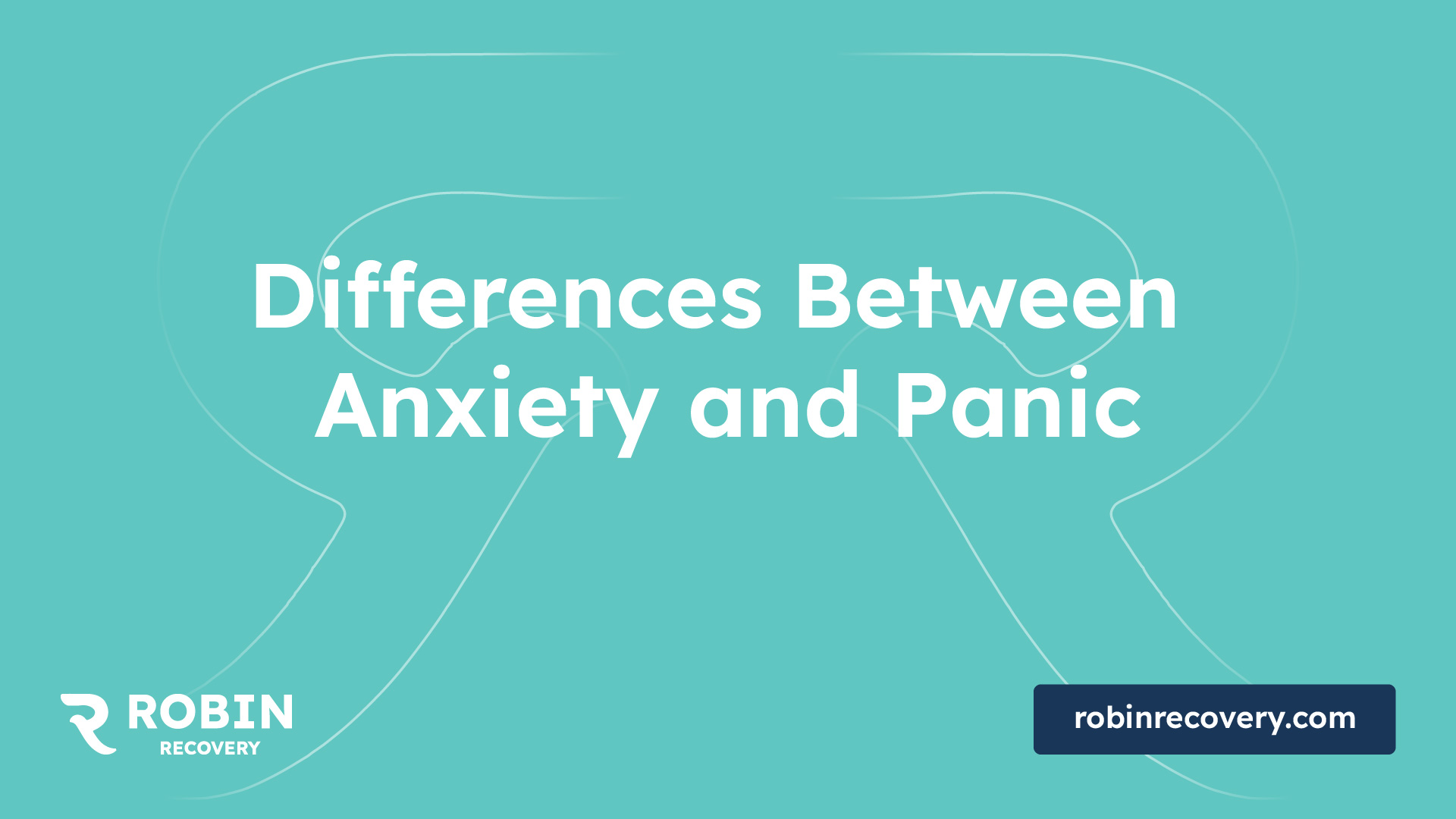Anxiety Attack vs Panic Attack Demystified

Understanding Panic Disorder
Definition and Characteristics
Panic disorder is characterized by recurrent and unexpected panic attacks. These attacks are sudden surges of intense fear or discomfort that peak within minutes and may feel like the individual is experiencing a heart attack or losing touch with reality. Panic attacks can be described by the following characteristics:
CharacteristicDescriptionFrequencyIndividuals experience repeated, unexpected panic attacks.DurationAttacks typically reach their peak within 10 minutes but can last longer.AftermathThere is often persistent concern about future attacks or significant changes in behavior due to these attacks.Emotional SymptomsFeelings of terror, fear of losing control, and worries about dying may accompany the experience.
Panic disorder is diagnosed when a person experiences these symptoms along with a month of ongoing worry about future attacks or the consequences of these attacks, which may lead to changes in behavior [2].

Causes and Triggers
The causes of panic disorder are not yet fully understood, but several factors can contribute to its development. These factors can include genetic predisposition, biological changes, and environmental influences. Panic attacks can also be triggered by various conditions such as other anxiety disorders, depression, obsessive-compulsive disorder, and posttraumatic stress disorder (PTSD) [1].
Common triggers for panic attacks may include:
TriggerDescriptionStressMajor life transitions or stressful events can initiate panic attacks.SubstancesCaffeine, alcohol, and certain drugs may trigger or exacerbate symptoms.Past ExperiencesTraumatic experiences or a family history of anxiety may increase vulnerability.
It is important to note that unlike anxiety attacks, which often have identifiable stressors, panic attacks occur suddenly and may happen without warning. Understanding these factors can help individuals identify their triggers and work towards effective management strategies. For further insights on how anxiety can relate to addiction, visit our article on anxiety and addiction.
Symptoms of Panic Attacks
Understanding the symptoms of panic attacks is crucial for differentiating between an anxiety attack vs panic attack. Panic attacks are characterized by a set of intense physical and psychological symptoms that can cause significant distress.

Physical and Psychological Symptoms
Panic attacks can present a variety of symptoms that may vary between individuals. The following table summarizes common physical and psychological manifestations experienced during a panic attack:
SymptomDescriptionLightheadednessA feeling of dizziness or faintness.Chest PainDiscomfort that may mimic heart-related issues.Hot FlashesSudden feelings of warmth that can cause sweating.ChillsSudden sensations of coldness often accompanying other physical symptoms.Stomach DiscomfortNausea or other gastrointestinal issues.Sense of ChokingA feeling of tightness in the throat or airway.Detachment from RealityA sensation of being disconnected from oneself or surroundings.
According to McLean Hospital, panic attacks can occur suddenly and unexpectedly, causing significant distress and impairment, especially if experienced frequently.
Duration and Frequency
Panic attacks are typically short-lived, though their duration and frequency can vary widely among different individuals. They are often described as episodes that last for a few minutes but may feel much longer to those experiencing them.
Duration and FrequencyDetailsTypical DurationUsually lasts between 5 to 30 minutes, often peaking within 10 minutes.FrequencyCan vary from rare occurrences to multiple attacks within a day or week.
Panic attacks can start in late teens or early adulthood, and factors such as stressors can increase the likelihood of their development.
It's advisable to seek support if panic attack symptoms are experienced. Making an appointment with a primary care provider can lead to a proper evaluation and potential referral to a mental health professional for further treatment [4].
Differences Between Anxiety and Panic
Understanding the distinctions between anxiety attacks and panic attacks is essential in recognizing and addressing them effectively. This section discusses the onset and triggers, as well as the intensity and duration of each type of episode.

Onset and Triggers
The onset of anxiety and panic attacks significantly differs. Anxiety attacks often occur in response to specific stressors, building gradually. Individuals may experience anxiety over an upcoming event or situation, with symptoms escalating over time. In contrast, panic attacks tend to arise suddenly and unexpectedly, without an identifiable trigger. According to the Cleveland Clinic, this is a key distinction, as panic attacks can strike without any forewarning.
Type of AttackOnsetTriggersAnxiety AttackGradual or suddenRelated to stressorsPanic AttackSudden and unexpectedTypically no identifiable trigger
Anxiety attacks may refer loosely to episodes of heightened anxiety, but they are not classified formally. They may be confused with panic attacks, leading to misunderstandings about the nature of one's symptoms [5].
Intensity and Duration
Panic attacks are characterized by intense episodes of anxiety, accompanied by severe physical and mental symptoms. These attacks are recognized as temporary yet profoundly distressing experiences that can occur with or without a clear cause.
In contrast, anxiety tends to be more generalized and persistent. While anxiety may escalate during periods of stress, it does not usually reach the extreme level of a panic attack. Panic attacks are also rarer and more severe than typical anxiety experiences.
Type of AttackIntensityDurationAnxiety AttackModerate to highVaries, often longer lastingPanic AttackVery highShort, typically 10-30 minutes
Common symptoms of panic attacks include shortness of breath, dizziness, nausea, and numbness. A clear understanding of these differences is vital for those experiencing these conditions, as it informs their approach to both self-care and seeking treatment. For further information on anxiety, check out our articles on self-medicating an anxiety disorder and anxiety and addiction.
Diagnosis and Treatment Options
In understanding the distinctions between anxiety attacks and panic attacks, it is essential to recognize the diagnostic criteria and available treatment options for each. This section outlines the criteria for diagnosis and the common therapeutic approaches employed in managing panic attacks.
Diagnostic Criteria
The Diagnostic and Statistical Manual of Mental Disorders, 5th edition (DSM-5) does not include anxiety attacks as a standalone diagnosis. Instead, it categorizes various anxiety disorders. For a diagnosis of panic disorder, specific criteria must be met:
Even if someone experiences panic attacks without a diagnosed panic disorder, seeking treatment is beneficial. Untreated panic attacks can escalate, potentially leading to panic disorder or other phobias.
Psychotherapy and Medications
Psychotherapy, commonly referred to as talk therapy, serves as an effective initial treatment for panic attacks and panic disorder. Among various approaches, Cognitive Behavioral Therapy (CBT) is highly effective. CBT helps individuals elucidate and manage panic symptoms, promoting understanding of their triggers and responses. Successful treatment can assist in overcoming fears linked to situations avoided due to prior panic attacks [4].
Medications also play a significant role in treatment. They can help alleviate symptoms associated with panic attacks and address any underlying depression. The following types of medications are commonly used:
Medication TypePurposeAntidepressantsReduce panic symptoms and anxietyBenzodiazepinesProvide quick relief from acute panic symptomsAnti-anxiety medicationsHelp manage overall anxiety levels
A healthcare provider may recommend a combination of medications if necessary, tailoring the treatment plan to the individual's specific needs. While self-care steps and lifestyle changes may assist in managing symptoms, they should complement professional treatment rather than replace it [4]. Those interested in exploring more about the relationship between anxiety and its management can refer to our article on anxiety and addiction.
Managing Panic Attacks
Managing panic attacks effectively involves implementing lifestyle modifications and recognizing the importance of seeking professional help. These strategies can significantly alleviate symptoms and improve overall well-being.
Lifestyle Modifications
Adopting a healthy lifestyle is crucial for individuals experiencing panic attacks. Certain practices can reduce stress levels and decrease the frequency and intensity of attacks. Some recommended lifestyle modifications include:
Lifestyle ChangeDescriptionRegular ExerciseEngaging in physical activity can help release endorphins, improve mood, and reduce anxiety. Aiming for at least 30 minutes of exercise most days can be beneficial.Balanced DietEating a nutritious diet can positively impact mental health. Consuming whole foods, fruits, vegetables, lean proteins, and healthy fats while limiting processed foods may help manage anxiety.Adequate SleepPrioritizing quality sleep is vital for emotional regulation. Establishing a regular sleep schedule can enhance overall mental health.Mindfulness and Relaxation TechniquesPractices such as yoga, meditation, and deep breathing exercises can help cultivate mindfulness and reduce anxiety.Avoiding StimulantsLimiting caffeine and nicotine intake can help decrease the risk of panic attacks, as these substances may worsen anxiety symptoms.
These modifications can complement other treatment options and provide a comprehensive approach to managing panic attacks.
Importance of Seeking Help
If an individual experiences symptoms of a panic attack, it is essential to seek medical assistance promptly. While panic attacks are not life-threatening, they can substantially impair the quality of life. It is crucial to differentiate panic attack symptoms from other serious health issues, such as a heart attack. A healthcare provider can conduct a thorough evaluation and rule out any medical conditions.
Panic attacks can start in late teens or early adulthood and may affect more women than men [3]. Ignoring the problem may lead to complications, including agoraphobia or concurrent anxiety disorders. Seeking support from a mental health professional can provide valuable guidance and treatment options, including psychotherapy and medications.
For individuals struggling with the interplay between anxiety and substance use, examining issues like self-medicating an anxiety disorder may also be important. Understanding and addressing these concerns can enhance the overall management and treatment of panic attacks.
By integrating lifestyle changes and professional assistance, individuals can take positive steps toward managing panic attacks and improving their overall mental health.
Impact of Panic Disorder
Quality of Life
Panic disorder can significantly affect an individual's quality of life. Patients often report feeling an overwhelming sense of fear and lack of control during panic attacks, which can lead to avoidance behaviors. This avoidance can limit daily activities and social interactions, resulting in feelings of isolation and depression. People experiencing panic attacks may also face an increased risk of developing substance use issues, as some may turn to alcohol or drugs as a form of self-medication to cope with their anxiety [8].
Studies highlight the disturbing reality that around 40% of first-degree relatives of individuals with panic disorder may also experience anxiety disorders, suggesting a potential genetic predisposition [7]. The overall impact on emotional well-being can be profound, leading many to feel disabled in their ability to manage daily life.
CategoryImpact Level (Low, Medium, High)Emotional Well-BeingHighSocial IsolationHighRisk of Substance AbuseMedium
Potential Complications
The complications of untreated panic disorder can be serious. Panic attacks may occur with other mental health conditions, further exacerbating the symptoms and complicating treatment efforts. For instance, individuals may develop agoraphobia, a fear of situations where escape might be difficult, which can lead to an inability to leave home without assistance [3].
The impact extends to increased risk of suicidal thoughts and reduced efficacy of treatments for concurrent mental disorders. Data suggests that approximately 60% of patients may achieve remission within six months when they adhere to treatment protocols, but relapses can occur [7].
ComplicationsLikelihood of Occurrence (Low, Medium, High)AgoraphobiaHighCo-occurring DisordersMediumSuicidal IdeationHigh
Understanding the impact of panic disorder is crucial for those affected. Seeking appropriate treatment and support can significantly improve quality of life and minimize complications. For more insights on managing anxiety, explore resources on anxiety and addiction or learn about common social anxiety disorder symptoms.
References
[2]:
[3]:
[4]:
[5]:
[6]:
[7]:
[8]:
